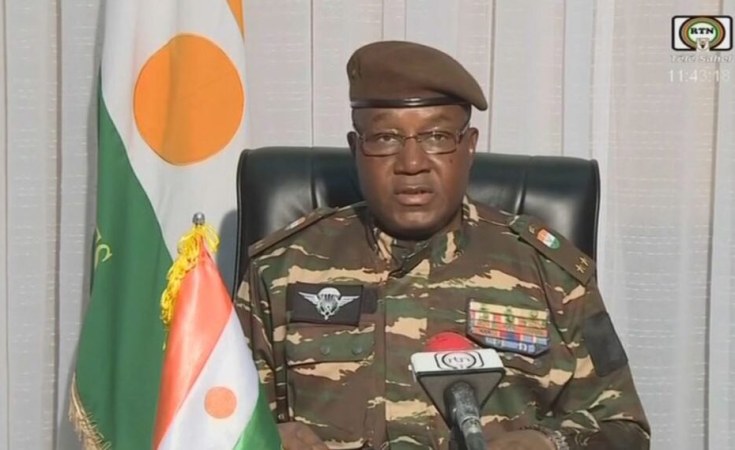But sanctions aren't enough - the AU and states must tackle root causes, including electoral fraud and service delivery failure.
Military coups were common in Africa during the Cold War, and now seem to be returning. Between January 2020 and August 2023, there were five attempted and nine successful coups - the latest being the military takeovers in Niger (July) and Gabon (August). Nearly 20% of African countries have experienced coups since 2013.
Most recent coups have happened in West Africa, especially in French-speaking countries. This has alarmed the Economic Community of West African States (ECOWAS), which hurriedly convened summits on the issue in February 2022 and July 2023.
As in Mali, ECOWAS countries have imposed sanctions on Niger and threatened to intervene militarily to dislodge the coup leaders if they fail to reinstate deposed president Mohamed Bazoum. And as with Mali and other cases, experience shows that sanctions alone cannot deter overthrows - the root causes must be addressed.
Coups in Africa don't come out of nowhere. Causes can be varied and include external and internal factors.
One external factor is ongoing neo-colonialism. Some countries outside the continent, particularly during the Cold War, worked behind the scenes to topple leaders they believed threatened their interests. Many African countries' heavy dependence on external support, including military and economic aid, makes it easier for foreign powers to use several means, including coups, to remove leaders who prevent them from advancing their interests.
Leaders focusing on development rather than enriching themselves are scarce in Africa
Internal factors such as poor governance, widespread corruption, nepotism and clannism are some reasons cited by recent putschists to justify removing elected civilian governments and their acolytes. Others include elite and ethnically based income and wealth capture, tampering with the constitution and insecurity (in the Sahel).
The failure of the African Union (AU) and regional economic communities such as ECOWAS to sanction their peers for electoral fraud and speak up when it matters most also breeds fertile ground for coups. Despite three court petitions challenging Nigerian President Bola Tinubu's election, ECOWAS quickly made him chairperson in July, well ahead of Nigeria's Presidential Election Petition Court decision to dismiss the petitions.
Leaders focusing on development rather than enriching themselves are scarce in Africa. The continent is endowed with abundant valuable natural resources, yet it accounts for about 60% of the world's poor. Infrastructure shortages, inadequate public service delivery and rampant unemployment, among others, feature in many African countries.
Political systems generally benefit only the ruling elite, who plunder public resources and lack empathy for the economic hardship experienced by their people. Frustrated by living in poverty without prospects for improvement, many young Africans risk their lives daily to cross the Mediterranean Sea for greener pastures. The vast gap between political leaders and the plight of the people increases conditions conducive to military coups or armed rebellions.
The AU and RECs have failed to sanction their peers for electoral fraud and speak up when it matters most
The population could vote incompetent leaders out of office, but democracy in many African countries is flawed. Leaders frequently 'cook' the constitution and use massive electoral fraud to maintain power - with no sanction from their peers at regional, continental or international levels.
Some have used these means to stay in control for over three decades with little to show in terms of socio-economic development. Even in countries where electoral democracy seems to function well, newly elected leaders often fail to deliver on their promises to improve citizens' welfare.
The inability of elected African governments to drive their countries' development agenda has led to a disaffection with democracy. Afrobarometer surveys in 30 African countries show that the proportion of citizens satisfied with how democracy works in their country declined from 50% to 43% between 2011 and 2021.
This is why Africa's recent coups, especially in West African Francophone countries, have received massive public support. People see their leaders as puppets who serve the interests of their colonial master, France, instead of implementing policies and reforms to improve their living conditions.
The population could vote out incompetent leaders, but democracy in many African countries is flawed
There is some evidence that the populace will resist military coups against leaders or governments they believe are serving their needs. Turkey witnessed the bloodiest coup attempt in its political history in 2016. With external support, a section of the Turkish military tried to unseat President Recep Tayyip Erdoğan. As news spread via social media, thousands of citizens gathered to resist tank fire and air bombardments. With the help of loyalist soldiers, they stopped the coup attempt.
Any solutions to the increase in military takeovers in Africa must tackle the root cause of the problem. The AU and regional economic communities should seriously investigate and address the underlying drivers.
They must respond effectively to electoral fraud and 'constitutional coups' that extend presidential terms. Their meetings should focus on improving governance, inclusive growth and development instead of abetting bad governance by waiting for a coup, then condemning it and issuing sanctions - which hurt the population more than the junta. And Africa's youth are unlikely to tolerate any form of neo-colonialism, so leaders must explain to their people how cooperation with the West and others is a win-win situation.
Military coups do not advance good governance, democracy and development in Africa. There is little evidence that takeovers deliver anything that citizens actually want. Coup leaders generally fail to undo the damage that justified their actions, and end up being removed from power by another military intervention, as in Burkina Faso in 2022.
Until African leaders hear the cry of their people, military coups will continue to occur and receive the support of citizens desperate for developmentally oriented leaders who consider their aspirations.
Kouassi Yeboua, Senior Researcher, African Futures and Innovation, ISS Pretoria
This article was first published in the Africa Tomorrow, the ISS African Futures blog.


